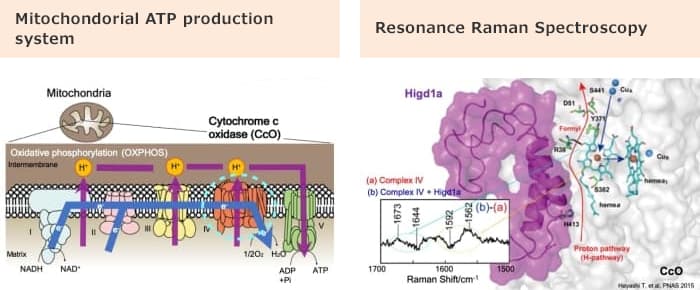Researcher: Yasunori Shintani


TOP PAGE > Development of therapeutic agents for mitochondrial diseases

In mitochondria, ATP is produced by electron transfer followed by oxidative phosphorylation. There are five protein complexes at the inner mitochondrial membrane.
Cytochrome c oxidase (CcO) is the terminal enzyme of electron transport chain, and the only enzyme that uses oxygen, and most of oxygen which are taken into cells are consumed by CcO. Dysfunction in electron transfer and oxidative phosphorylation causes mitochondrial diseases. As the primary cause of mitochondrial disease is dysfunction in respiratory chain, we wanted to improve electron transfer in these patients, if we can do that, it can mitigate all the pathogenic consequences.
We have been focusing CcO because we found an endogenous CcO activator, Higd1a. Higd1a directly integrated into highly purified CcO and increased its activity. Resonance Raman analysis revealed that Higd1a caused structural changes around heme a, the active center that drives the proton pump. As Higd1a is an allosteric modulator of CcO, we set up small compound library screening and performed more than 200 thousands cpds, and found several hit compounds.
We are currently working on further development of these CcO activators as potential therapeutic agents for mitochondrial diseases or other secondary respiratory dysfunction.
Research keywords
Cytochrome c oxidase
Electron transfer, bioenergetics
X-ray crystallography
Cryo EM structural analysis
Structure-based drug design (SBDD) research

Researcher: Yasunori Shintani